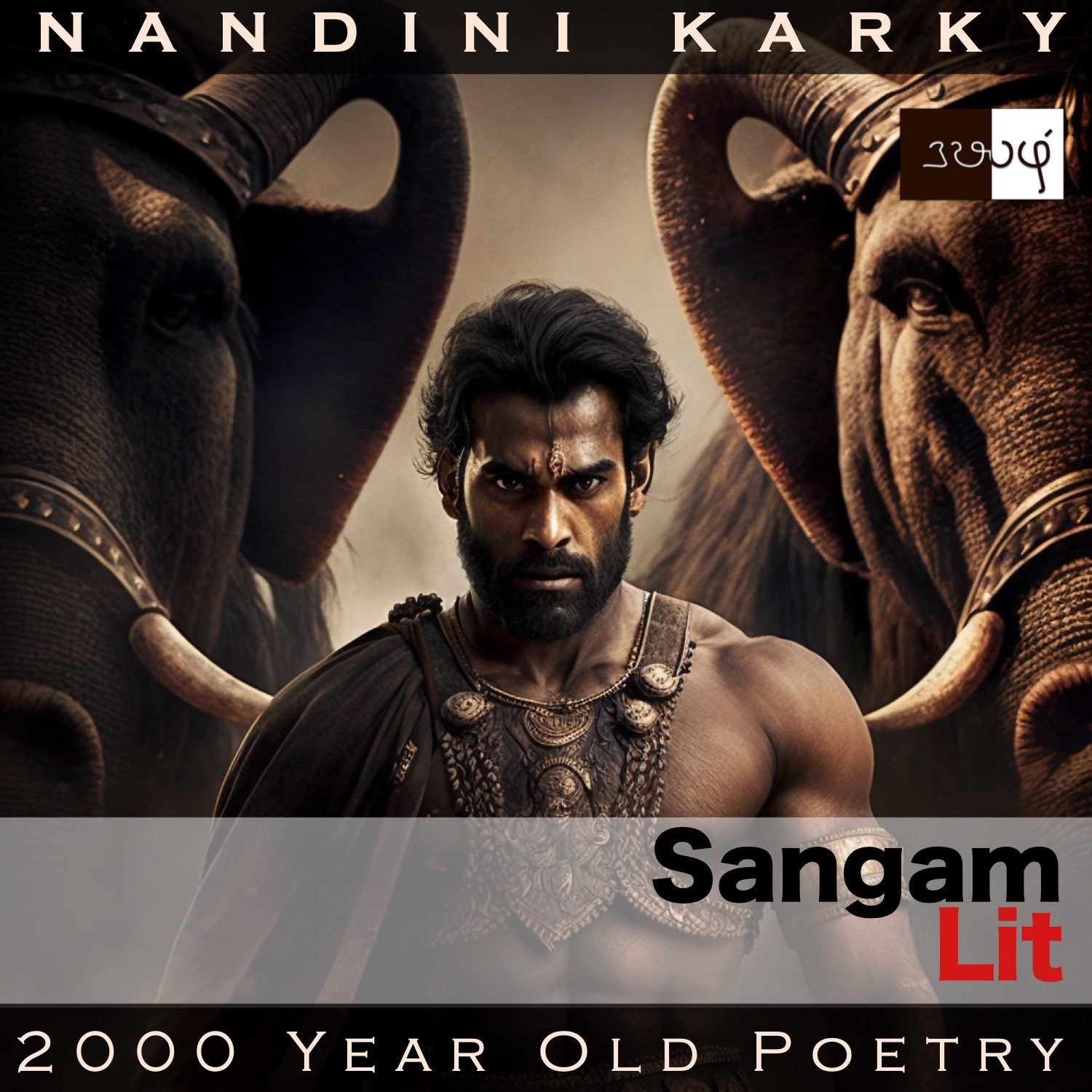Podcast: Play in new window | Download
Subscribe: Apple Podcasts | Spotify | Amazon Music | Android | iHeartRadio | Email | TuneIn | RSS | More
In this episode, we hear the perspectives of two rulers about this patron, as portrayed in Sangam Literary work, Puranaanooru 125, penned about the Velir King Malaiyamaan Thirumudi Kaari by the poet Vadama Vannakkan Perunchathanaar. Set in the category of ‘Vaagai Thinai’ or ‘King’s victory’, the verse illustrates the consequences of this king’s presence in the battlefield.

பருத்திப் பெண்டின் பனுவல் அன்ன,
நெருப்புச் சினம் தணிந்த நிணம் தயங்கு கொழுங் குறை,
பரூஉக் கள் மண்டையொடு, ஊழ் மாறு பெயர
உண்கும், எந்தை! நிற் காண்கு வந்திசினே,
நள்ளாதார் மிடல் சாய்த்த
வல்லாள! நின் மகிழ் இருக்கையே.
உழுத நோன் பகடு அழி தின்றாங்கு
நல் அமிழ்து ஆக, நீ நயந்து உண்ணும் நறவே;
குன்றத்து அன்ன களிறு பெயர,
கடந்து அட்டு வென்றோனும், நிற் கூறும்மே;
‘வெலீஇயோன் இவன்’ என,
‘கழல் அணிப் பொலிந்த சேவடி நிலம் கவர்பு
விரைந்து வந்து, சமம் தாங்கிய,
வல் வேல் மலையன் அல்லன் ஆயின்,
நல் அமர் கடத்தல் எளிதுமன், நமக்கு’ எனத்
தோற்றோன்தானும், நிற் கூறும்மே,
‘தொலைஇயோன் இவன்’ என,
ஒரு நீ ஆயினை பெரும! பெரு மழைக்கு
இருக்கை சான்ற உயர் மலைத்
திருத் தகு சேஎய்! நிற் பெற்றிசினோர்க்கே.
A new poet has something different to say about King Kaari. This song is sung after the outcome of the war between two great rulers of ancient Tamil land, the Chera and Chozha kings, when Kaari had rendered his support to the Chozha king. The poet’s words can be translated as follows:
“Akin to cotton spun by women, are these chunks of flesh, coated with fat, cooked by the raging fire. We get to eat this along with toddy poured into our huge empty vessels again and again, when we come to see you at your joyous court, O lord, who slays the strength of opponents! Like the sturdy ox that ploughs the land and then eats hay, may what you eat and relish become an everlasting elixir to you.
The one who battled and won, killing elephants towering like hills, describes you as ‘He, who made me win’. The one who lost the battle says about you, ‘If only the sharp-speared Malaiyan, whose fine feet, adorned with etched anklets, which speed upon the land and face the fury of the battle, was not there, it would have been easy for us to defeat our enemy’, and describes you as ‘He, who made me lose’. And so, you seem the same to both of them, O lord! You appear like God Seyai, who resides in high hills, enveloped by huge rain clouds, to those who have gained your support!”
Let’s take a closer look at the details herein. The poet starts by informing us about an activity of women then, that of spinning cotton. He compares that spun cotton to the fat covered, cooked chunks of meat that he and other supplicants at the king’s court get to eat along with jars of toddy. A remark to talk about the feast the king serves, an echo of his immense generosity. Comparing this king to an ox that works the field and helps rear paddy and then eats hay as food, the poet praises this attitude of the king to give away all he has to others and relish whatever food left. He adds a blessing to that food to become the king’s life-giving elixir.
Moving on to the events in the battlefield, the poet talks about how the victor, who obtained his victory by making tall elephants kneel before him, calls Kaari, the reason for his conquest. Then, turning to the loser, the poet describes his words saying, ‘If only Kaari was not there on the other side, winning that enemy would have been so easy for me’ and hears this loser call Kaari, the reason for his defeat. And so both the winner and the vanquished see Kaari as the sole contributor for their state, the poet adds ,and concludes by saying that Kaari is like the God, who resides on raincloud-shrouded hills, to those who trust in him.
An expressive verse with fascinating details about women’s occupation, presence of cotton and food served in royal courts. Striking is the portrait of this king, sketched in the words of the one soaring in victory and the one wallowing in defeat, who both equally celebrate his power and strength. This ancient verse seems to say that the marker of true greatness is in the equal respect and admiration in both friends and foes!




Share your thoughts...